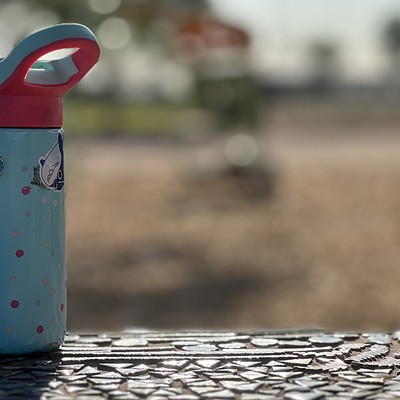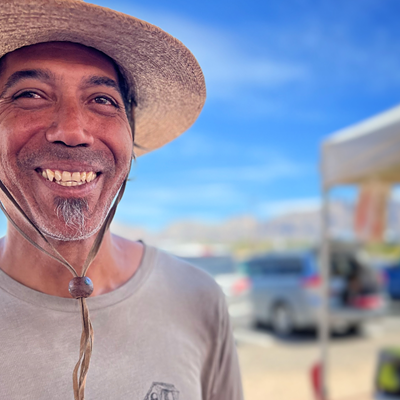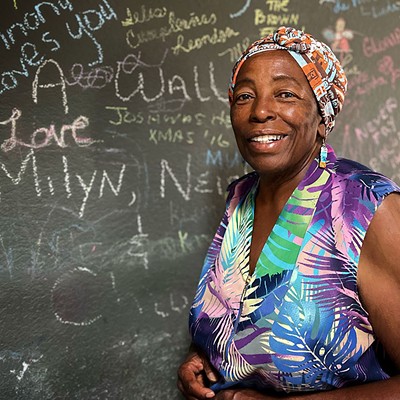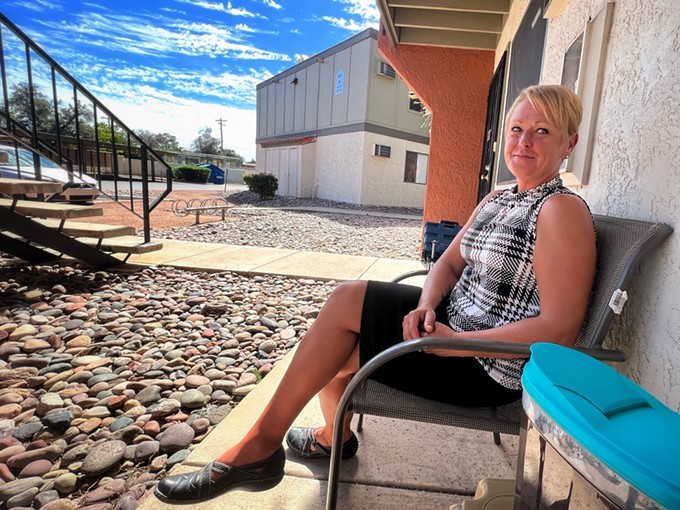
This is a place retained by nightmares. Peggy Sue Hamon is about dead in Tucson’s VA Medical Center parking lot. Delirious, doused in her own vomit, she is suffering septic shock from a flesh-eating infection. She is depilated from alcohol too, and terrified of her ex-boyfriend from whom she has a restraining order. Into hot bright light, she all but crawls from her car, which has doubled as her home since her money ran out.
She makes it to the hospital ER entrance where alarmed receptionists fish her pockets for a military ID. Doctors are shocked she is alive.
They saved her life with hasty action and surgery, draining two liters of fluid from a body infection, and placed her on 24-hour suicide watch.
This was April this year.
Peggy knew this was it. A now or never.
“I was thinking about my kids,” she said later. “My grandchild who was just born. Said to myself, ‘What would they think if you died like this?’ I was so lost. I made up my mind to live.”
She added, “If it weren’t for the staff at the VA, I wouldn’t be here.”
***
It is late October and 43-year-old Peggy is sitting at a little table in her bright tiny kitchen. She is alive, healthy and eager, and newly in love. Big expressive, hopeful eyes, cropped blonde schoolboy hair, straight-shooting with a tinge of obsequiousness; it is easy to see she spent two decades in exemplary military service. Unbroken monologues erupt on the hyper energy of new-found self-awareness, and myriad hours of challenging, taxing therapy. The murky gauze covering her fractured backstory unwrapped, in its place are truths, theories and a program. She whittles it down to simple words: “I made it over the hump, so I can share with others now.”
Most of that “hump” is about the unimaginable normalized, the choking down of sexual traumas to exist in a world that otherwise could not accommodate, and to struggle back into said world and resume her life in a way that has some meaning.
***
The “demonically possessed” child-rapist dad never went to prison. To hear daughter Peggy Sue Hamon tell it, the old Navy Nam vet should’ve been locked away forever, not living in a privately funded VA home in Idaho. Tick off the survivor reasons: terror, humiliation, self-blame, disillusionment, shame …
Peggy and her family lived in a trailer in the Pacific Northwest. Peggy was the sixth-born of eight kids. It is crammed, where a baby lived in a laundry basket, and a wood platform nailed to a hallway doubled as a bed. Church twice-weekly, Southern Baptist. The belief for Peggy, you’d get married and have kids, no other option. She was terrified to go home, from school, from work. Dad was a baker, worked early and late hours. “I would wait until he was asleep to come home.”
As a girl, Peggy would dream of becoming a nurse, caring for others. Early in high school suffered under the burden of home life and her weight had ballooned. She was made fun of, and missed a lot of school. But she worked steady at Dairy Queen and bought herself a car. By senior year, her father shamed her into losing the weight, but she was getting straight A’s and attending a separate nursing school.
Now, Peggy’s grandfather (father’s side) committed suicide when her dad was a teen. Dad’s mother lived in Washington state, prostituted out of the house.
So, at the mercy of dad’s hideous compulsions, the kissing, the clawing, the molesting, chasing children around the trailer with a chainsaw or forcing them to watch as Peggy’s older sister performed fellatio on him. “He would pee on top of us in the bathtub. His favorite thing to do was walk around the house with an erection and have us sit on his lap.” Dad raped her older sisters and older brother, and the brother in turn raped her when she was five years old. Dad would climb into bed naked and molest Peggy once she hit puberty and she would run. “We would sleep with our shoes on.”
She continues to recount countless episodes of revulsion and child abuse and family rape in detail because she is used to talking about this now, but she flusters and tears fill her eyes at times, run down her cheeks, and her words turn flat. She is revisiting a rotted place inside a healing place and the words are still never easy. With three children of my own it is difficult to try and inhabit a world where such things originate and I am hushed, notions of betrayal, defenselessness, and terrified children fill my head.
After violence the police would show up at the home and the dad would end up in the drunk tank, released the next day. The kids would show up at school traumatized and bruised. The teachers knew but there was “no follow up.” Mom would call pastors who would come to “cleanse” the house. The pastors knew. Neighbors knew. Nothing happened.
Peggy’s mother looked the other way. She didn’t think she could fix things at home but she could with the kids in her job as a preschool teacher. There was denial, rage, instructing the children to do what the father said so as not to suffer his drunken wrath. Mom was a prisoner too, helpless in her mind, helpless in her world.
“All I wanted to do was get out of that house. I gave him (my brother) a lot of forgiveness because I knew what it was like in that environment.”
She detests her dad. And her mother? “If she went and sought help I would really forgive her. Internally I guess I have.”
The Air Force provided Peggy a ticket out of the home, she summoned all her courage and enlisted. It flew in the face of family beliefs: A girl stays home until she is married. That’s it.
Through the testing and basic training, she was gone. She specialized in health services management. She is smart, learns fast she was able to bloom in a militarized zone of discipline and immediate accountability; the horrors of what a dad can do to his children lived deep inside her, left to fester, a buried rage.
In 2000 she was stationed at an Air Force duty station on an island in the Azores outside Portugal, where it was “one woman to every ten guys.” She was raped.
Peggy didn’t bother reporting it, so a male friend did. “I was so sick to myself,” she said. “I couldn’t cry, that would show weakness. It’s what I knew.”
Two other women came forward. A hearing saw the guy kicked off the island, but not out of the Air Force. “The unit loved him,” she said, a dour chuckle inside a shrug. “He was ranked higher than me.” That soldier got the Air Force boot later after getting caught watching porn on a government computer.
Peggy floundered emotionally, grasping at whatever forces of desire bounced around the universe, striving to muddle the severity of others into contours of one she could love. One she thought she deserved.
Stationed in Florida, Peggy discovered she was pregnant by a guy she’d broken up with in Portugal. She later saw that same guy in a starring role on an episode of Cops, busted for picking up a trans sex worker in Las Vegas.
She met and married her ex-husband in Florida, a military and I.T. specialist who happened to know the man who had raped her. He told the husband to be careful with Peggy.
“I just pushed all of this off,” she said. “It was more me just trying to establish a life. It wasn’t long in that marriage that I recognized the red flags.”
Her eight-year Air Force commitment ended. They birthed the first child (a son) and soon a daughter with heart issues (open heart surgery at six months old), and moved around — Washington state, Yuma, Arizona and finally, Louisiana. Peggy earned a bachelor’s degree as a business systems analyst. In 2012 she joined the military again — the Louisiana National Guard — for stateside emergences and overseas combat. The military gave her that strict structure, a sense of place and purpose, a good income for her family. Her upbringing at least taught her what not to do with her children.
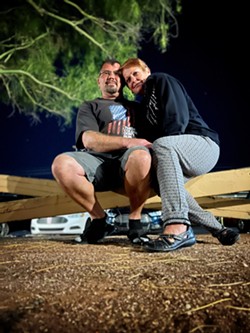
Fulltime in the National Guard, trained as a petroleum specialist, she worked hurricanes, floods, ice storms, and in 2017, spent 10 months in the U.S. War in Afghanistan. She was schooled for advance leadership and made it to an E6 rank (staff sergeant) and commanded a squad, knew the nuances of wartime fuel distribution, audits and contracts, the security for local nationals and fueling tankers in Kabul. “I was terrified of bombs,” she said. “Afghans were terrible at aiming.”
These were triumphs despite her raging ghosts and realities, and she talks of shielding marital abuse from her children: “You don’t think about your past, you’re in survival mode. Mother mode. I will say this about my ex-husband: he was not comparable to my dad. But I didn’t know how weird it was until I got out of it.”
She had also begun drinking to numb festering rages. “As the kids started to get older, the drinking had gotten worse. It was hurting my life and being a mother.” At one point she entered a treatment program. It didn’t stick.
In Afghanistan, the longing for her children left pains in her gut nightly (“before the Afghan deployment, I was so focused on my kids”). Yet, her husband moved another woman into the family home, which she learned while facetiming with her daughter. Her kids were shocked.
She met a guy an ex-Marine in Louisiana soon after the split and divorce from her husband. He fit her dad’s archetype; controlling, emotionally and physically abusive. There was the torque between her personal strictures, moral conflicts between what was right and what was broken, who she would think she was, and how easy it was to descend into the abyss of emptiness. The drinking made it so much worse.
Hurricane Laura in 2020 took out her house. Her children despised this new boyfriend, but by this time her son was married and her teen daughter was off to college on Peggy’s G.I. Bill benefits. She left Louisiana and moved to Tucson with her boyfriend and it was painful to move far away from her kids. “I told my children ‘y’all need to focus on your life, enjoy life.’ I didn’t want to cause more torment with them.”
She tried to leave him, had good work as a dispatcher at Primevara Foundation, which, it should be noted, offers distressed people second chances.
This guy, this ex-Marine was driving an ATV when it crashed in March. She was the passenger and woke up in a hospital with brain bleed, head staples, a broken femur and the hematoma that started the infection that a month later put her in sepsis. She left her boyfriend and panicked. It was hotels and hiding, physical pain and suicidal ideation, and blackout drinking, until she was living in her car. That’s when she arrived at the VA hospital.
The months of healing began. Out of the hospital, she landed at Old Pueblo Community Service for vets, where she completed a doctor-led trauma-intensive program. Soon she was housed at Esperanza En Escalante (EEE), an effective non-profit that provides housing and social rehab for homeless veterans and families. There, EEE case worker Mary Cuevas got close to Peggy.
“Peggy’s story is one of success,” Cuevas told me via text. “She has overcome so much and is living a loving and happy life. Peggy gives me such a profound sense of hope. That hope is all about making it out of the horrors of abusive childhoods.”
Peggy is now out of the National Guard on medical discharge for PTSD and in an apartment. Her 19-year-old daughter recently said to her, “you weren’t meant to die yet.”
Peggy’s siblings live in various parts of the country, and she is close with some. She says she is the first of them to earn a college degree and also seek professional help. “None of us as parents have passed down the abuse to our children. My kids have never met my dad. Maybe my mom once or twice.” Her siblings exist in what she calls an odd scenario. “The way people process the trauma is all different.” She adds, they all suffer “deep depression.”
Peggy adds, “my situational awareness is on high. You can’t turn that off. If someone is going through this, if they are even taking the blame, I want them to know they aren’t alone.”
***
Peggy’s one-bedroom apartment she shares with her boyfriend, Eric Ackerman, is a stone’s throw from EEE, maybe a location of comfort for her, whose car had been repossessed. Two bikes parked neatly together against a wall of the living room tell something else; their use aligns with a world that now makes some sort of sense, inner peace emits freely as forehead sweat. It is a foundation, based on a mutual understanding of life struggles.
It is difficult to prove PTSD for military disability, the grief merchants, the doctors and therapists need to sign off. Peggy is waiting for her full disability to kick in. She is hunting for work and, for a woman with her experiences, she is often told she is overqualified. She needs to work; wants to work.
“I ask myself, ‘What do I do today?’ Well, service to others, and write my story.” Soon she will travel back to Louisiana to meet her grandson. She talks at length about finding acceptance with her past.
Now, we must meet Eric. I was introduced one night in their apartment. He is soft-spoken, gentle, speaks only when spoken too, like a guy in charge of guarding something important. One could say he looks ex-military; high and tight hair, air of confidence. He gets up early.
He has children, with whom he speaks daily. It wasn’t always that way.
The two met while staying at EEE. She asked for a shovel one day and he appeared with one. His story dovetails hers in many frightful ways. He grew up with family trauma and his older brother committed suicide because of it. He suffered the same depression. He served in the Navy and then the Army. He broke his back in the Army stateside moving medical equipment, losing his chance to become a Green Beret. He spent five painful years in a wheelchair, and it took 10 years to get his disability. He spent a decade homeless or “couch surfing,” he stole, he panhandled. He found heroin for the pain and got strung out. He cooked meth in Florida and went to jail for nearly a year. He first moved to Arizona for the cheap heroin. Simple as that. He acknowledges it was hardly any reason to live.
His last girlfriend died in his arms in Tucson after a string of nights doing drugs. His final impulsion was pushing a shopping cart filled with his belongings miles to the VA hospital while withdrawing from heroin in the middle of a blazing Arizona summer.
He’s been sober since. “I was just done with drugs,” he said. “I suffered enough.”
He receives military medical disability and works many hours weekly as a volunteer maintenance man at EEE, his way of giving back. He talks a lot about giving back. He is grateful to be here. The man is at peace finally and it shows in his carriage, his perspective, his speech.
Timing is everything in this life. Peggy and Eric lived in Florida at the same time and laugh about it. Had they met then, catastrophe.
The couple will begin visits with a therapist together, to learn what not to do. It is their dream to live on an acre of rural land outside Tucson, with animals and a garden. “And live in peace,” Eric says.
Outside the apartment, the couple smoke cigarettes. Peggy, sitting on Eric’s lap, said, “I would envy couples that were happy, plans for the weekend, festivals, wake up in the morning and say, ‘I love you.’ I never thought I would have that.” Eric nods in firm agreement.

